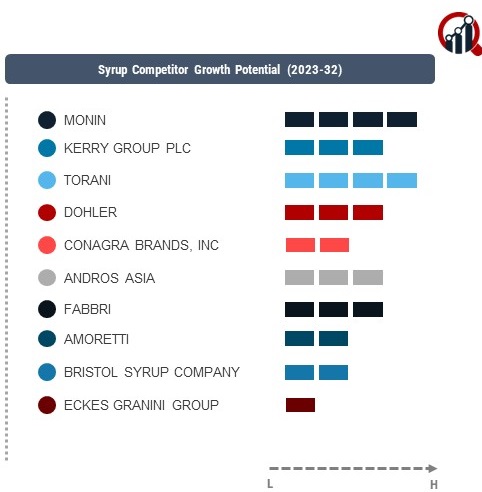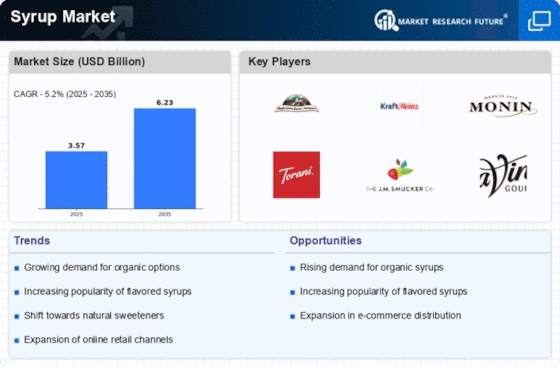Top Industry Leaders in the Syrup Market

Strategies Adopted by Syrup Key Players
The syrup market is a dynamic sector witnessing growth due to diverse applications across food and beverage industries. A detailed analysis of the competitive landscape reveals key players, their strategies, market share factors, new entrants, industry news, investment trends, and recent developments in 2023.
Key Companies in the Syrup market include.
- Monin
- Kerry Group Plc
- Torani
- Dohler
- Conagra Brands, Inc
- 1883 Maison Routin
- Andros Asia
- Fabbri 1905
- Amoretti
- Bristol Syrups Company
Key players in the syrup market deploy strategies such as product diversification, strategic partnerships, and geographic expansion. The Hershey Company, for instance, has been focusing on introducing innovative syrup flavors to meet evolving consumer tastes. Monin has expanded its global presence through collaborations with international beverage chains, enhancing its brand visibility and market reach.
Factors for Market Share Analysis
Market share in the syrup industry is influenced by factors such as brand recognition, product quality, pricing strategies, and effective distribution channels. Companies that can offer a diverse portfolio, maintain consistent product quality, and adapt to changing consumer preferences are better positioned to capture a larger market share. Moreover, strategic alliances and collaborations can also play a significant role in expanding market presence.
New and Emerging Companies
The syrup market has seen the emergence of new companies targeting niche segments or introducing innovative products. Small and medium-sized enterprises are capitalizing on the demand for natural and organic syrups, catering to health-conscious consumers. These emerging companies often focus on unique flavor profiles and sustainable sourcing practices to differentiate themselves in the competitive landscape.
Industry News and Current Company Updates
Recent industry news indicates a growing consumer preference for natural and clean-label products, influencing companies to reformulate their syrup offerings. Tate & Lyle PLC, for example, announced a commitment to reduce added sugars in their products, aligning with the global trend towards healthier alternatives. Additionally, companies are increasingly investing in research and development to create syrups with functional benefits, such as those fortified with vitamins or antioxidants.
Investment Trends
The syrup market is experiencing notable investment trends, with a focus on sustainable sourcing, production efficiency, and technological advancements. Investors are keen on companies that demonstrate a commitment to environmentally friendly practices and ethical sourcing of ingredients. There is also an increased interest in startups that leverage technology to enhance production processes and create unique formulations.
Overall Competitive Scenario
The competitive scenario in the syrup market is marked by intense rivalry among key players and the entry of new competitors. Larger companies leverage economies of scale, while smaller players focus on niche markets or specific product categories. Pricing strategies, marketing efforts, and responsiveness to consumer trends are crucial in maintaining a competitive edge. The industry is witnessing collaborations between manufacturers and retailers to optimize supply chains and ensure efficient distribution.
Recent Developments
The syrup market witnessed several noteworthy developments. One key trend was the surge in demand for plant-based and natural sweeteners, driven by increasing consumer awareness of health and wellness. Companies responded by introducing syrups made from alternative sweeteners such as agave, maple, and date syrup, capitalizing on the growing preference for clean-label products.
Another significant development was the rise in sustainable packaging initiatives. Several key players announced plans to transition towards eco-friendly packaging materials, responding to consumer concerns about environmental impact. This move aligns with broader industry efforts to reduce the carbon footprint associated with packaging and addresses the growing demand for environmentally responsible practices.
Furthermore, the year 2023 saw a shift in marketing strategies, with companies placing a greater emphasis on digital platforms and e-commerce channels. The COVID-19 pandemic accelerated the adoption of online shopping, and syrup manufacturers adjusted their marketing strategies to reach consumers directly through digital platforms, ensuring a seamless customer experience and facilitating product accessibility.
In terms of regulatory developments, there was increased scrutiny on labeling practices, with regulatory bodies tightening regulations to ensure accurate and transparent labeling of syrup products. Compliance with labeling requirements became a focal point for companies, as consumers increasingly sought clear information about ingredients and nutritional content.











